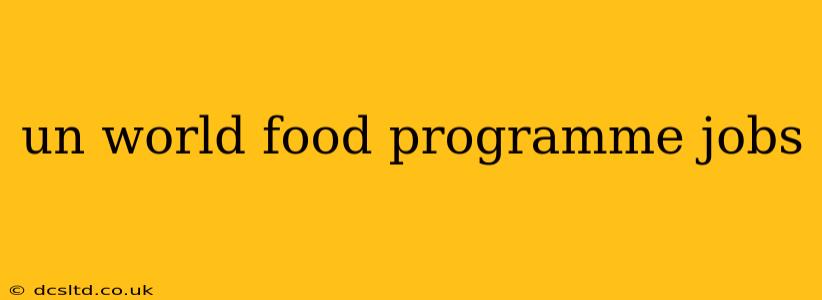The United Nations World Food Programme (WFP) is the leading humanitarian organization fighting hunger worldwide. With a global reach and a critical mission, the WFP offers a diverse range of jobs for individuals passionate about making a difference. This guide explores various aspects of finding and securing a position within this impactful organization.
What types of jobs are available at the World Food Programme?
The WFP employs a vast workforce with diverse skill sets and expertise. Job opportunities span numerous fields, including:
- Humanitarian Aid & Logistics: This is a core function, involving the procurement, storage, and distribution of food and other essential supplies to areas in need. Roles often involve field work, logistics management, and supply chain expertise.
- Program Management: Professionals in this area design, implement, and monitor WFP projects, ensuring effectiveness and accountability. Strong analytical and project management skills are crucial.
- Emergency Response: These roles focus on responding swiftly and efficiently to crises and emergencies, providing crucial aid where it's needed most. Experience in disaster response and resilience-building is often essential.
- Finance & Administration: The WFP requires skilled professionals in finance, accounting, human resources, and administration to manage its extensive operations globally.
- Information Technology: From developing systems to managing data, IT professionals play a key role in supporting the organization's technological infrastructure.
- Communications & Advocacy: These professionals are vital in raising awareness about the WFP's work and advocating for change. Strong communication and public relations skills are essential.
How do I find WFP job openings?
The primary source for finding WFP job openings is the official WFP website's career portal. Regularly checking this site is crucial, as openings are often posted and filled quickly. Utilize the website's search filters to specify your area of expertise, location preference, and contract type. Additionally, professional networking sites like LinkedIn can provide updates and potential connections within the organization.
What are the requirements for WFP jobs?
Requirements vary greatly depending on the specific role. However, several common attributes are highly valued:
- Relevant Experience: Experience in humanitarian work, international development, or a related field is often essential.
- Education: Many roles require a university degree, and postgraduate qualifications might be advantageous for senior positions.
- Language Skills: Fluency in English is typically required, and proficiency in other languages, particularly those spoken in the regions where the WFP operates, is highly desirable.
- Technical Skills: Depending on the role, specific technical skills such as GIS, data analysis, or project management software proficiency might be necessary.
- Commitment to Humanitarian Principles: A strong commitment to humanitarian principles and a passion for combating hunger are essential for all WFP employees.
What is the application process for WFP jobs?
The application process usually involves:
- Online Application: Submitting your application, CV, and cover letter through the WFP's online career portal.
- Screening: Initial screening of applications to ensure candidates meet the minimum requirements.
- Interviews: A series of interviews, often with multiple individuals from different departments.
- Assessment: Depending on the role, candidates might be required to complete assessments or tests to evaluate their skills and abilities.
- Background Check: A thorough background check is conducted before an offer of employment is extended.
What are the benefits of working for the WFP?
Working for the WFP offers a unique and fulfilling experience. Benefits can include:
- Making a meaningful impact: Contributing to a vital humanitarian mission with a direct impact on people's lives.
- International experience: Opportunities to work in diverse locations across the globe.
- Career development: Exposure to various roles and responsibilities, fostering professional growth.
- Competitive compensation and benefits: A competitive salary and benefits package, including health insurance and retirement plans.
How competitive is it to get a job at the WFP?
Competition for WFP jobs is generally high, particularly for roles in specialized fields or locations with high demand. A strong application, showcasing relevant experience, skills, and a commitment to the WFP's mission, is vital for increasing your chances of success. Networking within the humanitarian sector can also provide valuable insights and potential connections.
This comprehensive guide provides a solid foundation for understanding the opportunities and processes involved in securing a position with the UN World Food Programme. Remember to always refer to the official WFP website for the most up-to-date information on job postings and application procedures.
